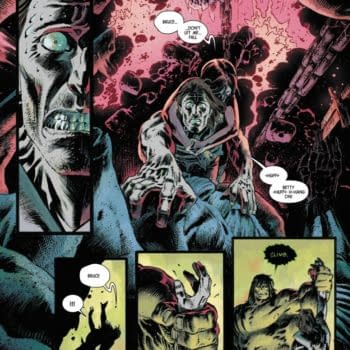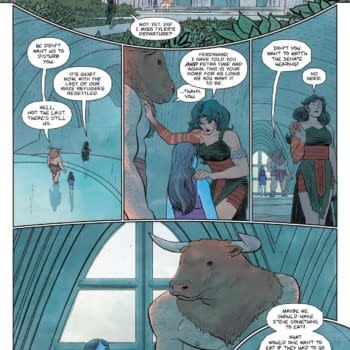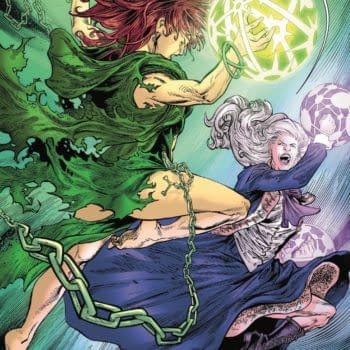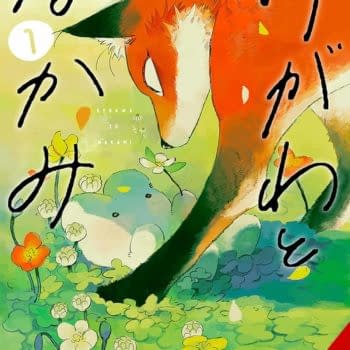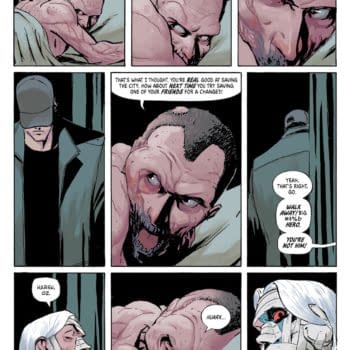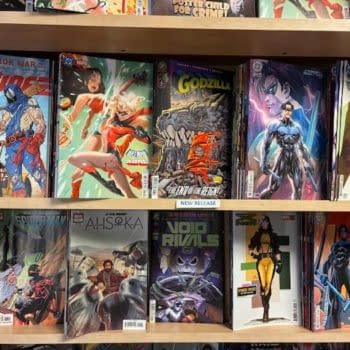Posted in: Comics, Recent Updates | Tagged: amanda conner, cerebus, Christie Marx, Columbia University Library, Comics, creator-owned comics, dark horse, dark horse comics, dc comics, elfquest, entertainment, fantasy comics, Jan Duurscema, Jill Thompson, Joellyn Auklandus, john byrne, John ostrander, Karen Green, Kim Yale, Lorraine Reyes, louise simonson, manga, Marian Churchland, marie severin, Marvel Comics, Mary Jo Duffy, Renae de Liz, richard pini, webcomics, wendy pini, women in comics
Celebrating Dark Horse's Women In Comics – Elfquest's Wendy Pini Is Proud To Be A 'Tough, Stubborn, Long-Surviving Woman Pioneer'
Since 1978, the world of Elfquest has inspired the minds and artistic bent of generations of readers, and the unstoppable trajectory of its ever-expanding world has moved through various platforms, displaying the full versatility of the comics medium, from mainstream publishing, to self-publication, webcomics, and now back to print in a new incarnation with Dark Horse in Elfquest: The Final Quest.

But before we get started, have a look at this gem, the original "proposal" artwork which Wendy Pini showed DC and Marvel in 1977, a year before publication actually started in 1978:
Hannah Means-Shannon: Wendy, your perspective on comics is bound to be so vast that it's hard to know where to start, so I'll start at the beginning. Did it seem at all unusual to you or others in 1978 that you, as a female creator, wanted to make comics?
Wendy Pini: No, not to me. Because I had been drawing comics for my own amusement since childhood. I used to take a roll of paper towels and, with crayon or colored pencil, draw a comic that unrolled like a scroll – each segment of paper towel was a different scene. You see, I loved animated cartoons so much, always, and must've realized at a very young age that cartoons and comics were related. I discovered fandom in my mid-teens and met fellow fans like Gary Walker and Fred Patten who helped me get into the amateur comics publishing game via APA's and fanzines. It was the world of purple ditto-master where I thought you had to draw every dot of your own zip-a-tone! LOL! And, yes, I was kind of a rare female beast in that world.
But by the time I became a professional sci-fi illustrator in the early 1970's, I had met quite a few terrific pro and fan women fantasy artists and writers (Alicia Austin, Bjo Trimble, Lela Dowling, D.C. Fontana, Andre Norton and too many others who deserve mention) via sci-fi and fantasy conventions. I was one of many up-and-coming women creators. And that's the mindset with which I entered indie comics publishing in 1978. Of course women can kick ass and get the job done in the entertainment field! I'd already seen it done!
True, there weren't too many women writers, artists and editors in the mainstream comics industry at the time – and even fewer in the fledgling indie comics– but they were there (Marie Severin, Mary Jo Duffy, Louise Simonson, Jan Duurscema, et al). So I didn't see myself as that unusual. And that's good. Because, with all the hard work Richard and I had to do and the "deadly" deadlines I had to meet, it would've been a burden to be self-conscious of being some kind of role model.
When interviews and write-ups about Elfquest started to proliferate there was, indeed, focus on what was perceived as my unique status. I was held up as an example of a rare female artist/writer carving my own unique niche, with decidedly unusual fantasy material, in a male dominated, superhero-obsessed industry. Thirty-five years later, I'm still spoken and written of that way, when I'm spoken and written of. With the Elfquest series revival through Dark Horse Comics in 2013, we've noticed we're getting more positive press than ever before. And we're starting to see me referred to as an "indie comics pioneer." That's the label I love most, regardless of gender: "pioneer." However, am I proud of being a tough, stubborn, long-surviving woman pioneer? You bet.
HMS: Do you think that there has been an ebb or flow in the number of women working in comics? Were some decades or eras where it was more noticeable that women were making comics, or has it always been rather rare?
WP: Well, here's the thing. When it comes to comics, women have always been interested in subject matter other than superheroes. I would say there was a real spike in more women creators entering the comics arena – particularly the indies – in the 1990's, commensurate with the huge rise in popularity of Japanese anime and manga. From the hundreds of girls' and women's portfolios I've looked at over the years, I feel safe in saying most aspiring female cartoonists are influenced by anime and manga. The drawing style is feminine, gracious and sensual – the opposite of superhero graphics. Manga style lends itself naturally to stories of fantasy, romance, the supernatural and horror, which a big percentage of female fans are really attracted to.
Elfquest has the distinction of being the first American fantasy comic series influenced by manga and anime. Some call it the first American manga. Back in the 1970's, many in the comics industry didn't know what to make of my storytelling style; Japanese comic fandom, then, was tiny and the material hard to acquire. When Dragon Ball Z and countless other imported anime burst on the pop-culture scene through the 1990's, Elfquest, which had been ahead of its time, was suddenly cool and relevant. Suddenly a lot of folks got it who hadn't gotten it before. That's when Hollywood started nosing around the elves in earnest. (We still have yet to see where that goes.)
I firmly believe female fans drove the late 1990's anime/manga phenomenon. Insatiable women consumers were responsible for the shelves being full of manga in big chain bookstores and the dozens of American manga publishers that popped up. And it naturally follows that women creators came out in droves with their own manga-influenced comics. A few got their properties acquired and others went into self-publishing, because the Internet provided copious info on how to do it. Despite the anime boom's decline in the early 2000's, more than ever we're seeing predominately manga-influenced web comics and self-published floppies, featuring all kinds of innovative subject matter by women. Comic Cons are great venues for them to get exposure.
HMS: At what point did you realize that Elfquest had the potential to become so vast and sprawling? Did you think that it could possibly last such a long time during its early days?
WP: That awareness grew gradually for Richard and me. And it was a mixed blessing. Elfquest was the rara avis, lightning captured in a bottle at the right place and right time that could never be duplicated. And we were in charge of it. Fan feedback was enormous – and so were expectations. Over the years it became a delicate balancing act between staying true to the story and characters we'd conceived, and doing what we knew would keep the fans happy. We had an epic tale to tell. We knew it would take years – though how many, we never truly imagined. I like to joke that, had I known I'd still be drawing the @$%^&* overly-detailed elves in 2014, I'd have designed all 700 plus of 'em bald, nude and identical! Nevertheless, I'm grateful and so pleased that Elfquest's popularity has lasted this long. It's become a family thing, parents and even grandparents passing it on to their kids – when the kids are old enough for the famous orgy scene, that is!
HMS: Could you tell us a little bit about the decision to donate the Elfquest archives to Columbia University and how that came about? What impact do you hope this will have on the future perception of comics?
WP: At the 2012 San Diego Comic Con, a vivacious, striking woman named Karen Green came up to our table in Artists Alley. I was busy with a sketch so she spoke mostly to Richard. Karen is the Ancient & Medieval History Librarian at the Columbia University Libraries, as well as the curator of Columbia's graphic novel collection which she, because of her love of the medium, fought for and founded. (Can you tell I adore her?) She asked Richard if Warp Graphics had in its possession any of the original Elfquest art and scripts and would we consider donating them?
Well, this was like a miracle, a dream come true. We almost cried. You see, Richard has the soul of an archivist. Carefully, painstakingly, faithfully, for as long as we've been together, he has cared for and catalogued all my original artwork, back to childhood – everything that could be preserved. Prior to Elfquest, I sold my work at conventions and via private commissions. But we never sold any of the original pages of Elfquest and damn little of the ancillary material (it truly would've been like selling off our children). So, thanks to Richard, it's all there, in perfect condition. And, quite frankly, now that we're both in our 60's, we were wondering what was going to become of this trove. Karen's suggestion that we donate everything, not just Elfquest-related material but much earlier art – even my Red Sonja costume! – to Columbia University provided us with a divine solution to our dilemma.
But more, because the Warp Graphics collection will be available for as long as the University stands, to anyone interested – not just students – my hope is that the work will speak to new generations of artists and writers about fantasy storytelling as metaphor for addressing, and perhaps illuminating, the human condition. Comics can do that, you know – they're important like that, all kinds of comics.
The major characteristic of my work is emotionality, depth of feeling. I take an old-fashioned approach to illustrated storytelling that is character-driven and based on what Joseph Campbell calls the Hero's Journey. There's no avenue I haven't explored, in my career, to make an emotional connection with an audience through a combination of words, light, shadow and color that all turns into a kind of music. Because I believe if you can genuinely stir others' emotions – make them hear the music – you can transform lives. I, myself, was transformed early on by the classic illustration, music and literature I was exposed to by my teacher-grandmother Helen Fletcher and parents Stuart and Beth Fletcher, to whom I'll always be grateful.
Through Karen Green and the Columbia University Libraries, I hope my work will reach out and possibly inspire others. There's no greater delight to me than to see someone's eyes light up with a new idea I've sparked in them. That's what it's all about.
HMS: Do you see any parallels between your decision at different junctures to self-publish Elfquest and the current creator-owned movement where many creators are self-publishing and looking to establish their own fanbases? What advice would you give to self-publishers right now?
WP: Elfquest, along with Cerebus the Aardvark, First Kingdom and Star*Reach, began the independent comics movement in the mid 1970's. Each of those titles was odd, peculiar, unable to pidgeonhole. The mainstream didn't know what to make of them. But the world, especially a largely untapped female fandom, was ready for them. The time was right and the playing field was pretty clear. There was room on the shelves, back then, for alternative comics to strike it big. Elfquest was the first American graphic novel series to make the leap into the big chain bookstores – and with wild success. It paved the way for many others. Those days will never come again.
Today, everything has changed. There's only one major comics distributor and infinitely greater competition for shelf space – what there is of it. Big chain bookstores have all but disappeared. The number of mom-and-pop comic book retail shops is much smaller than it was. The mainstream isn't selling anywhere near the numbers it used to.
HOWEVER there is a relatively new frontier that strongly resembles the clear playing field of the mid 1970's. It's called the Internet.
The best advice I can give an aspiring self-publisher is: become web savvy. Richard and I had to learn everything about self-publishing from the seat of our pants back in the 1970's. It's even more vital now, because current competition is brutal and your property's chances of getting picked up by an established publisher are extremely rare.
So learn how to establish a presence online. Launch your comic on a dedicated web site and build your audience there. Learn how to promote yourself and your property via the social network. This is how we launched my adults-only web comic Masque of the Red Death in 2007. My name, alone, was not enough to draw tons of readers, initially. But we knew this was a property that could go places if it could find its audience. Gradually, via the interwebs, it did. Now it's being developed into a Broadway-style musical!
In addition to the wise precaution of keeping your day job, set up a "donate" button on your web site and supplement your income via an online payment service. (Crowd funding is the way many excellent web comics make it into print these days.) Attend as many comic conventions as you can afford. Network, network, network with other indie creators and find out what printers and distribution channels they're using. What will be the size of your run? What will be the costs, the time frame you need to work within?
The hardest part, given all these things you'll have to do – and keep doing – to stay in the game, will be finding time to do the actual creative work on your comic. That will be the true test of your passion and dedication. If you want it badly enough, you will make it happen. Model yourself after the success of those who are doing so.
HMS: What do you think are the biggest factors that will determine whether we will see more female creators working in comics? Is it a matter of women pursuing self-publication to get their work out there, or do you think that mainstream publishers need to be more pro-active in hiring female artists and authors?
WP: I'm going to say something a bit radical here. I don't think mainstream publishers are as guilty, as some now complain, of not being pro-active enough when it comes to hiring women creators. Now, before you get out the baseball bats, hear me out. You see, I've not only been on the creative end of comics, I've been on the publishing end – though Richard, by far, has done the lion's share.
Publishers, be they mainstream or indie, have always lined up on their knees to acquire talent that can deliver the goods and meet a deadline while doing it. Warp Graphics certainly had sore knees back in the 1990's when we were publishing several titles a month. Male, female, or "other" – we didn't care who or what you were so long as you could draw the elves on model, or write good Elfquest stories, and meet your deadlines. In that regard we were exactly like our mainstream and indie competition. Heck, mainstream women creators/writers/editors Kim Yale (Batman, STNG) and Christie Marx (Sisterhood of Steel, Jem), writer Joellyn Auklandus, and artist Lorraine Reyes worked for us right alongside the likes of John Byrne and John Ostrander.
My point is, if you're a woman artist and/or writer and you're good, fast, and can stay on schedule, IMHO you have a shot at getting work from both mainstream and indie publishers, competitive as the market is. Amanda Conner is a great example, as is Jill Thompson. But you have to be able to deliver what the publisher wants and needs.
Marvel and DC are primarily superhero driven. Are there a lot of women out there interested in drawing veiny, sweaty, muscle-bound, testosterone-pumped, scantily clad males (and females!) bashing each other? Evidence suggests there are not. Both these companies publish other kinds of titles, but guys and gals bulging out of their leotards are their mainstay. DC Comics had Elfquest for almost four years and we did some beautiful graphic novels with them. But ultimately, they didn't "get" Elfquest, didn't know how to market it. DC gets Batman, not Cutter. And that's OK. The parting was amicable. But it demonstrates my point. My gender had nothing to do with DC Comics publishing Elfquest; it was simply what they wanted and needed at the time, until they didn't.
Before moving on, I just want to say I seriously think aspiring women creators need to learn how to take better care of themselves re: the sexual harassment issue. For sure, I respect and support the women who are eloquently and rationally speaking out for change. But there's just too much online vituperation and victimhood going on. Let's face it, the entire entertainment industry is dominated by highly charged male egos. That isn't going to change soon, if at all. So, if you want in, you need to cultivate a strong sense of your own self worth, patience, smarts, and a very thick skin.
Chances are the editor, art director, or publisher from whom a woman's going to want feedback on her portfolio, or to solicit a writing job, will be a guy. So she needs to be alert because some of them – not all, by any means – but some guys get a kick out of abusing power. Just like some women do. I've seen horrendous, vicious behavior from both sexes in this business. If you think about it that way, it levels the playing field.
What have I learned in nigh on to forty years as a female professional? Men have become somewhat more aware, but certain basic behaviors stay the same. When an industry pro invites you up to his room to discuss your work, well, ding ding ding! A man's room is no place to take a meeting. A decent, respectful male won't even ask. Therefore, if you choose to go up, don't be naïve about it.
I realize this is not politically correct, but some might find it a fresh perspective. I think getting hit on verbally, while it's unprofessional on the man's part, should not automatically be considered harassment or abuse. You're just getting hit on verbally. Big deal. It's better if it never happens, but if it does, think of it as a test. Instead of getting all flustered and upset, there's a way to handle it with humor and grace that can, in some cases, get you to the next level: a fair hearing for your talent. Guys in power often respect Lauren Bacall-type coolth.
That said, at the first hint of the guy's language turning hostile or insulting, you don't act outraged. You don't engage at all. You just walk away with dignity. It's his business loss. There are other fish in the sea. And if he, then, physically grabs or paws you (which has never happened to me, but certainly has happened to others) that's assault and that's when you yell "911."
In the Avengers movie, Black Widow demonstrates that she is stronger than Loki's rape threats and sexist insults. (Ironic how millions of female fans swoon over him, even though he did that, right?) It couldn't hurt to follow Natasha's example and know how to take care of yourself. Also, it couldn't hurt to make the effort to see things more from a male point of view. Because you will, perforce, be working with men. Understand the game, and I believe you can win without compromise.
HMS: Can you suggest the work of any female comics creators you think deserves more attention or that fans of Elfquest might enjoy?
WP: I've already mentioned a number of excellent lady talents, but I also want to add Renae de Liz who's doing a very interesting and attractive crowd-funded graphic novel version of Peter Pan. I feel she deserves recognition not only for the quality of her art, but for her resourcefulness in successfully utilizing Kickstarter to realize her self-published dream. I'd also like to mention Marian Churchland, the first female artist to draw and color a Conan story for Dark Horse Comics. There are many, many others. Just visit Artists Alley or various booths at any major Comic Con. Women are a real presence there, feverishly, joyfully creating for you. And some of the results are stunning.
We can't thank you enough for taking the time to give us such full answers to our questions, Wendy. You are truly an inspiration for readers and aspiring comics creators. The complete Elfquest can now be read online digitally free of charge, though a donation to the project is suggested.

















